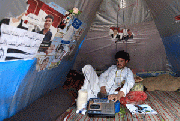SANAA – A Gulf-sponsored accord to end a bloody political
dispute between President Ali Abdullah Saleh and Yemen’s opposition will be
signed on Sunday, officials from the ruling party and opposition said.
“The signing will take place on Sunday in Sanaa,”
Sultan al-Barakani, the assistant secretary general of the ruling General
People’s Congress, said of the accord which is sponsored by the six-member Gulf
Cooperation Council (GCC).
“We have called the GCC secretary general and informed
him that all the parties have agreed to sign, and have invited him to come to
Sanaa,” he added.
An opposition official who spoke on condition of anonymity
also said that “the signing will take place on Sunday.”
A GCC statement issued in Riyadh said meanwhile that GCC
foreign ministers will in the Saudi capital on Sunday to discuss the situation
in Yemen. It did not mention the signing of the agreement.
GCC Secretary General Abdullatif al-Zayani flew out of Sanaa
on Wednesday after sources close to the negotiations between the regime and
opposition said the two sides again failed to ink a power-transfer accord.
According to the proposal, as outlined by the GCC, Saleh
would quit office within 30 days in return for immunity from prosecution,
before a government of national unity is formed and elections for a new
president held after two months.
Yemeni political sources said that Saleh’s change of heart
over the accord followed intense pressure from Washington and various European
capitals.
US President Barack Obama said in a speech on Thursday that
Saleh “needs to follow through on his commitment to transfer power.”
“We must acknowledge that our friends in the region
have not all reacted to the demands for change consistent with the
principles” of human rights and freedoms, Obama said in a key speech at
the State Department.
Yemen’s opposition had earlier blamed Saleh for the failure
to sign the agreement on Wednesday.
Saleh “foiled the initiative by refusing to sign
it,” the head of the opposition Common Forum, Yassin Saeed Noman, said.
Saleh, in power since 1978, “has refused the peaceful
choice and is ready to do everything to remain in power,” said Noman.
Before the announcement that the accord would be signed, the
embattled Saleh had called on loyalists to stage a rally in his support Friday.
It was now unclear if it would still go ahead.
Journalists had been also invited to attend a military
parade on Sunday in Sanaa to mark the 21st anniversary of unity between the
country’s north and south.
South Yemen was independent from the 1967 British withdrawal
from Aden until it united with the north in 1990. The south seceded in 1994,
sparking a short-lived civil war that ended with it being overrun by northern
troops.
Since the protests broke out in late January, rifts have
surfaced within Yemen’s army.
Pro-opposition troops led by dissident General Ali Mohsen
al-Ahmar control the capital’s northern and western regions, while troops loyal
to Saleh control the rest of Sanaa.
Anti-regime protesters on Thursday staged a massive rally in
Taez, Yemen’s second-largest city, carrying banners accusing Saleh and his
ruling party of “maneuvering.”
In Sanaa, protesters at the University Square, dubbed
“Change Square” after it became the epicenter of demonstrations in
February, held banners that read: “No initiative, no dialogue, departure
is the final decision.”
“The initiative does not concern us,” prominent
activist Tawakul Karman said. “We insist on completing our revolution to
the end (until) we overthrow Saleh.”
“We will continue to protest despite our awareness that
we could be killed or arrested. We are not afraid,” said Karman.
But the protesters have expanded the field hospital they set
up at the square and urged more doctors to volunteer, according to an AFP
reporter.
The impoverished but strategic Arabian Peninsula country has
been gripped by protests since late January calling for Saleh’s ouster.
Security forces have mounted a deadly crackdown on the
protests, leaving at least 180 people dead, according to a toll compiled from
reports by activists and medics. –MEO






Leave a Reply